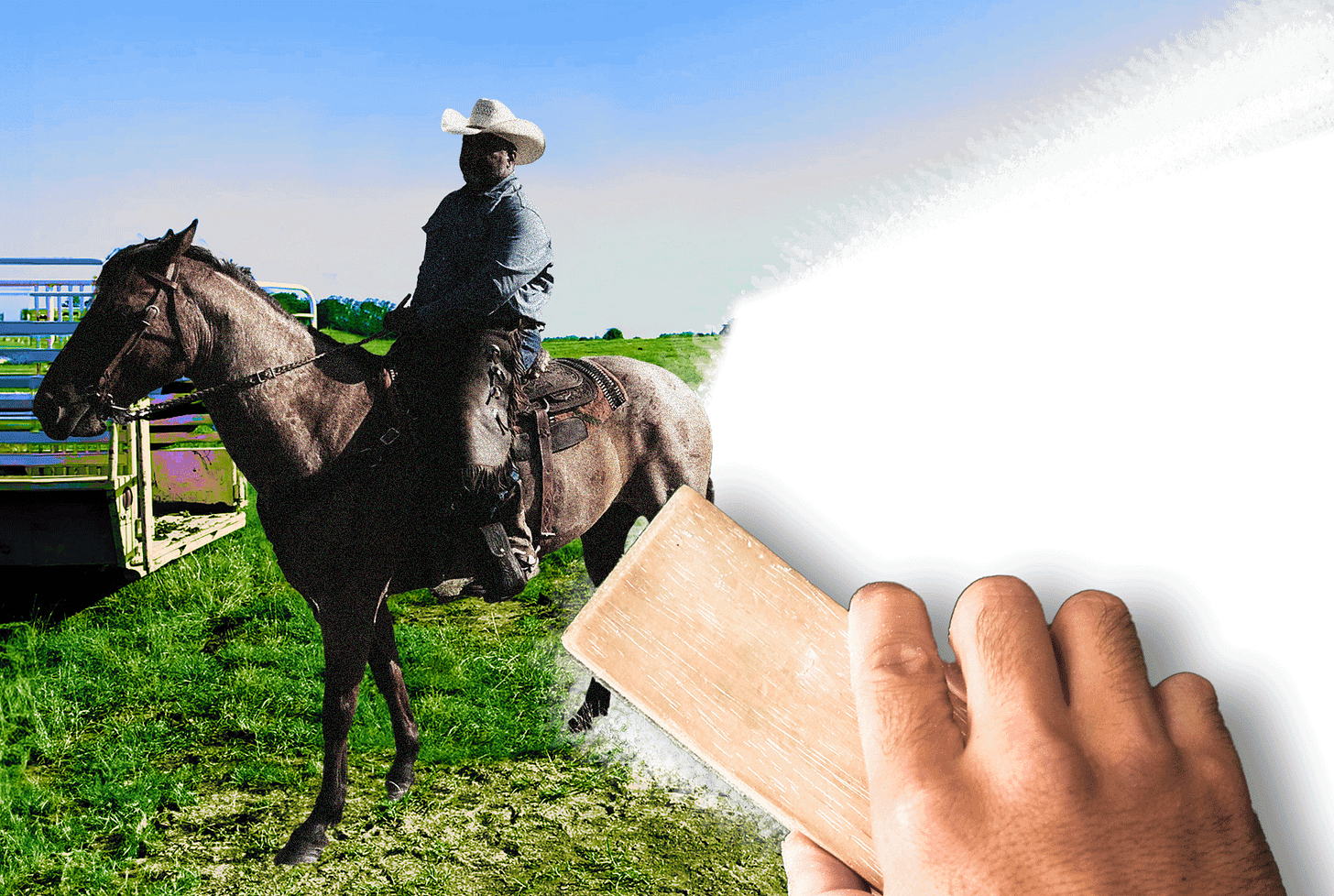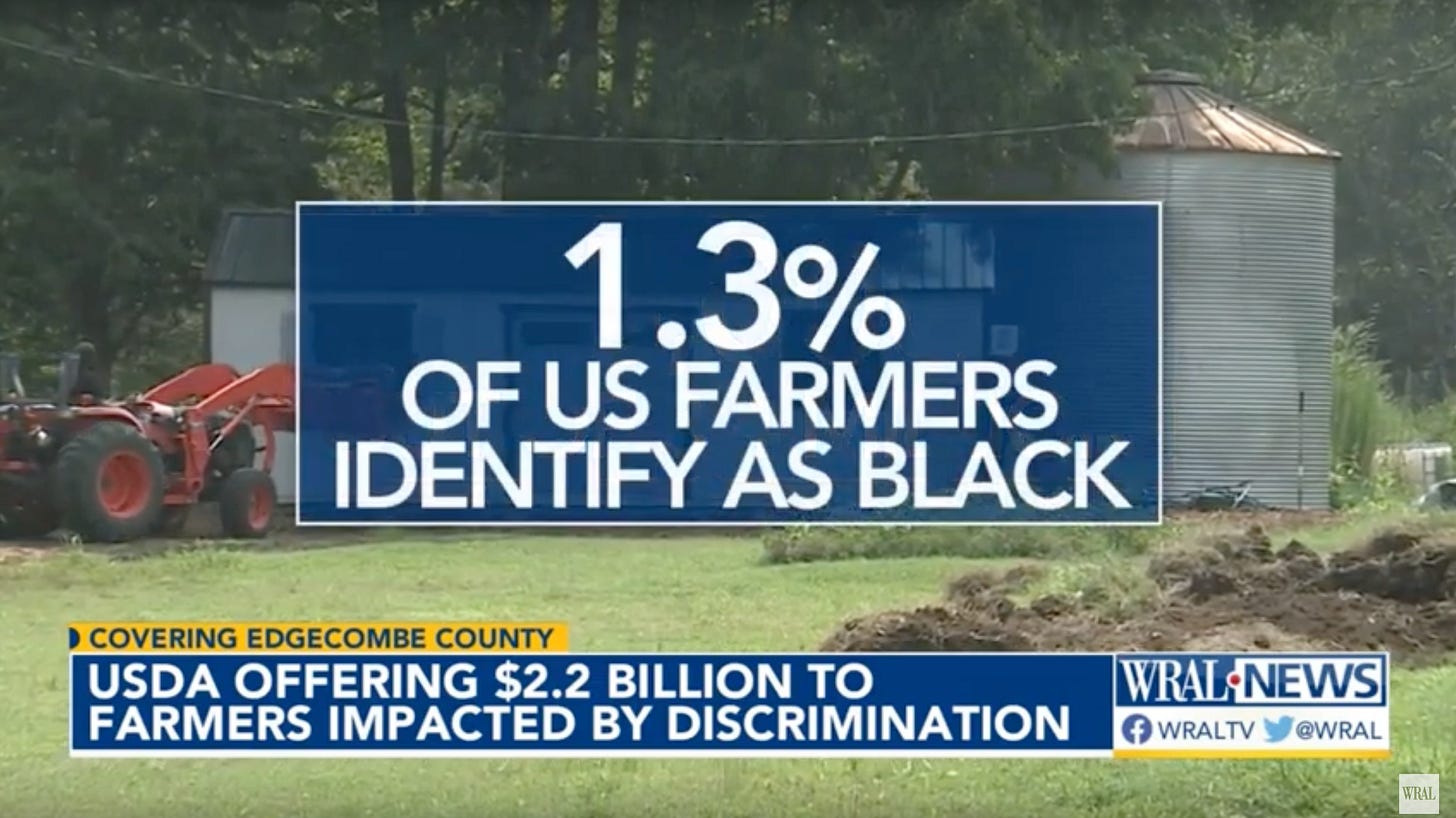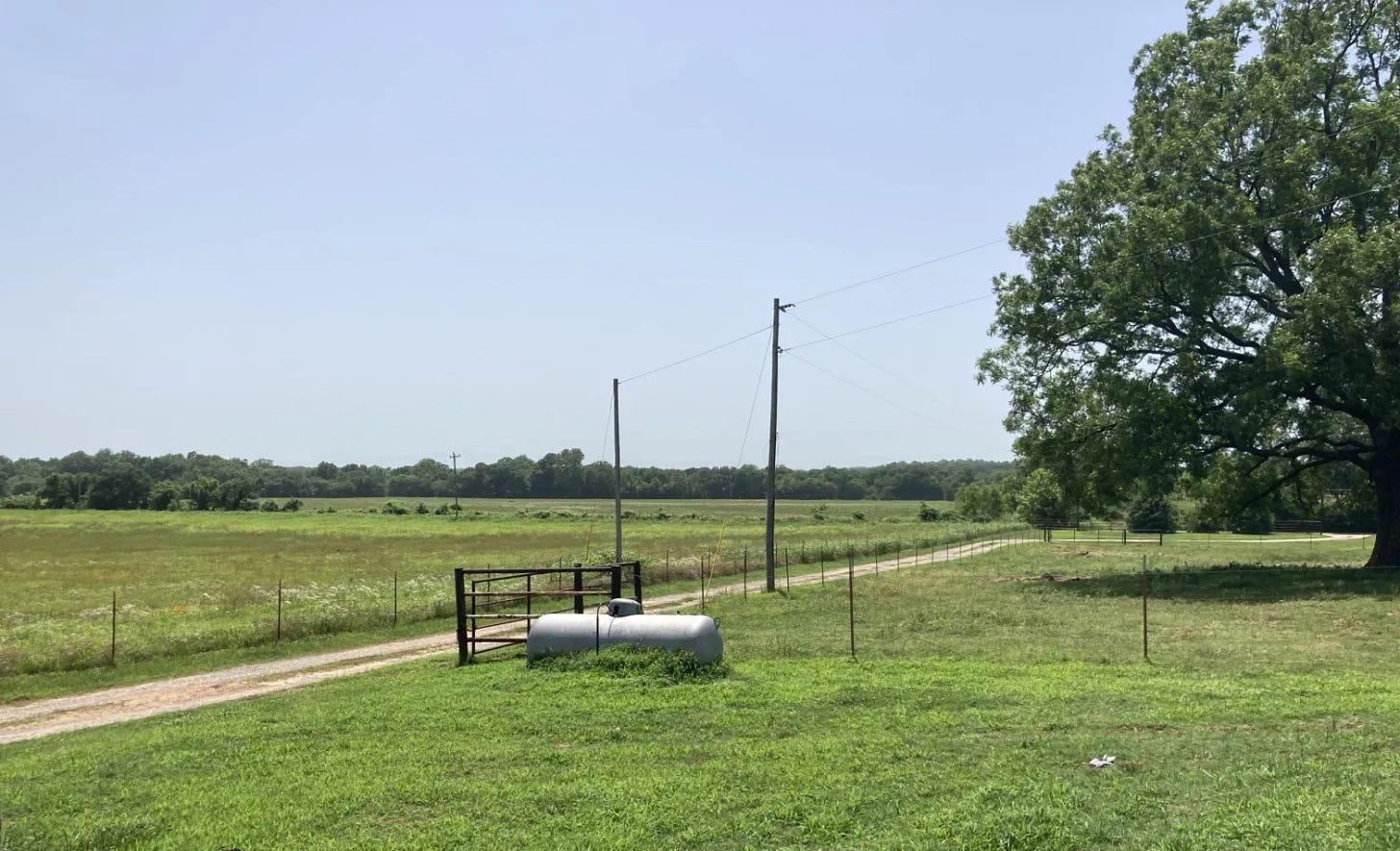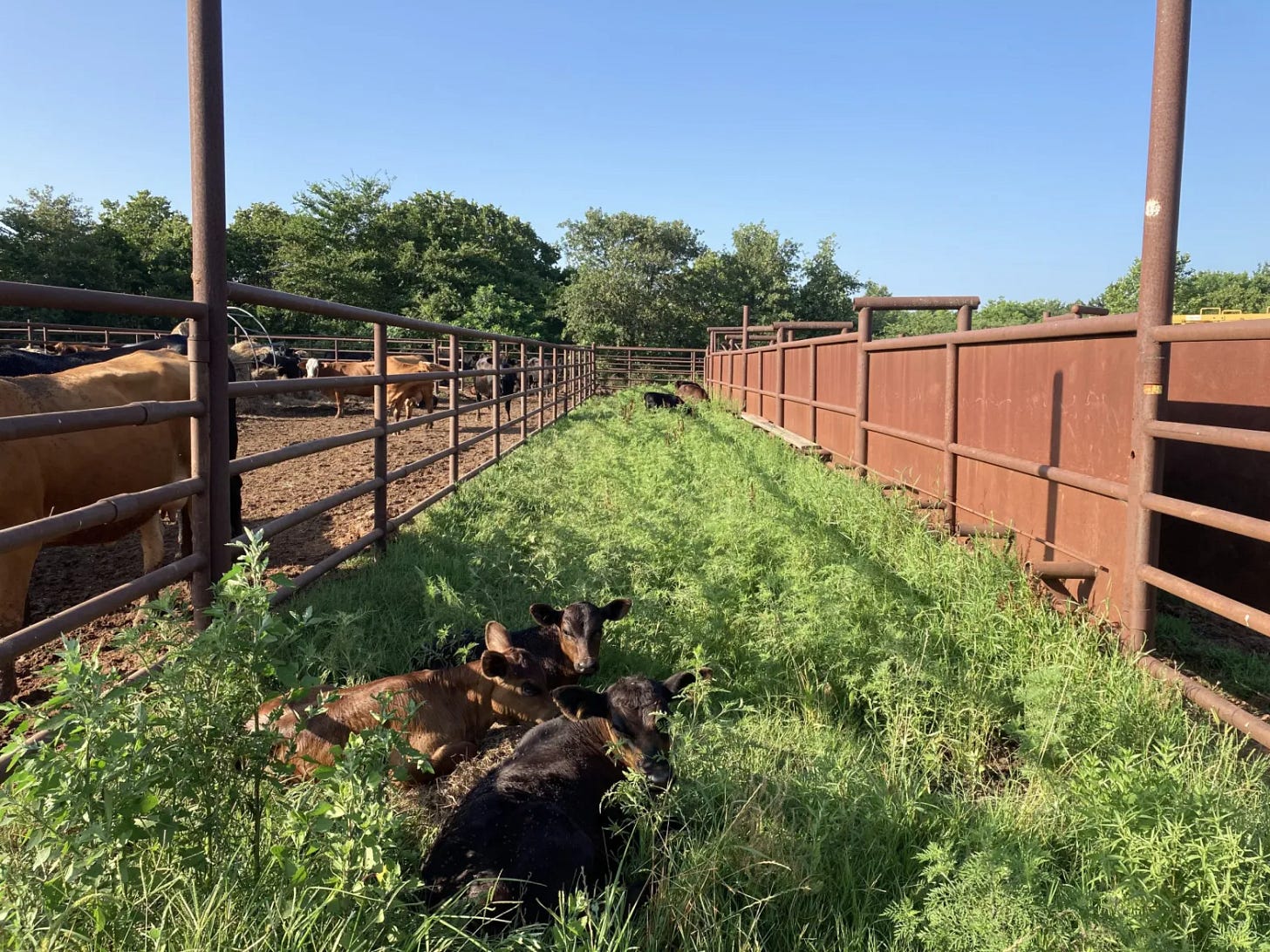America's Black farmers are disappearing. What can be done to ensure their survival?
Black farmers are living on less land and carrying heavier financial burdens than white farmers. The USDA, once part of the problem, wants to turn things around.

Nate Bradford Jr. on his ranch. Photo by April Simpson & Center for Public Integrity. Art by Matt Lewis.
This article was originally published by the Center for Public Integrity, a nonprofit investigative news organization based in Washington, D.C.
by April Simpson
The morning sun hugs the horizon just as Nate Bradford Jr. hops into his pickup truck to make the hour drive home. Many in this rural Oklahoma town are getting ready to go to work. Bradford is getting off. He works as a gas plant operator, earning around $70,000 a year.
The job pays the bills, but his schedule is a grind because he alternates between working the day shift and the night shift. Seven days; seven nights. One week off. Repeat. He tells himself he can’t do this job for another 20 years.
Bradford lives on a 160-acre farm and his dream is to make his living from it — hire a foreman to maintain the cows and property, build a nice home for his family on the high ground across the creek, and pass on what he can to his three children, including one already studying agribusiness west of Tulsa at Langston University.
But the past keeps blocking his future. It’s just as true for other Black farmers and cattle ranchers: They are a dwindling lot, living on less land and battered by financial hardships and uncertainties that place a heavier burden on them than on their white counterparts.
This newsletter is supported by its readers. If you enjoy it, please consider helping it grow by sharing it with others or becoming a free or paid subscriber!
Upgrade to paid
One study found that Black farmers lost $326 billion in land — and wealth — between 1920 and 1997 alone. Today’s Black-owned farms are smaller and earn less than farms owned by white people.
Black farmers are severely restricted by having less access to credit, the lifeblood of agriculture that allows farmers to successfully operate a farm from one season to the next. The U.S. Department of Agriculture (USDA), a lender of last resort, can help farmers who have nowhere else to go. But for decades, the department denied Black farmers credit and access to benefit programs. And it still struggles to remedy the impact of that history of discrimination. A Center for Public Integrity analysis of data from the USDA found that the agency’s Black borrowers have the highest loan delinquency rates of all racial and ethnic groups.
“Black farmers and ranchers, it’s a dying deal,” Bradford says. The industry has changed so much that the “only ones who gonna survive now is people who are big operations.”

An image from WRAL News states that only 1.3% of farmers in the United States identify as Black.
The People’s Department
Agriculture Secretary Tom Vilsack likes to describe the USDA’s role in the words of Abraham Lincoln, who, in his last address to Congress in 1862, called it “The People’s Department.”“President Lincoln knew the importance of agriculture to our prosperity — particularly at a time when about half of all Americans lived on the farm,” Vilsack said in a column commemorating USDA’s 150th anniversary.
Now, less than 2% of Americans still live on farms. And the data confirm that today’s farms and farmers are markedly different than they were in an earlier era.
For instance, the number of farmers has dropped 67% since 1900, even as the U.S. population boomed, according to the Congressional Research Service. USDA figures indicate that four of every five farmers hold jobs off their farm, like Bradford. Most spouses do, too.
Black farmers are different from their white colleagues in many ways, yet many would argue that the major difference separating them is the color of their skin. The historical impact that discrimination has had on Black people in social, political and make-or-break economic terms has continuing consequences for farmers today.
“Historical discrimination in this country has been about Black and white, not that others have got everything they deserve either,” said Lloyd Wright, a former director of the USDA’s Office of Civil Rights. “If you’re trying to address racial discrimination and you don’t address the Black problem, you’re really not addressing racial discrimination.”
Black farmers wonder whether The People’s Department is doing all it can — and should — be doing for people like them.
The department discriminated against Black farmers when it “denied, delayed or otherwise frustrated the applications of those farmers for farm loans and other credit and benefit programs,” while disbanding its Office of Civil Rights and ceasing to respond to claims of discrimination, U.S. District Judge Paul Friedman wrote in approving a 1999 settlement agreement in a lawsuit that challenged the USDA to fulfill its mission to Black farmers.
Successful claimants received some combination of cash, debt relief and tax payments. But the agreement did not require the department to fire anyone who had engaged in discrimination or change its ways, because the plaintiffs didn’t ask for that.
“There has always been a disconnect between what President Lincoln envisioned as ‘The People’s Department,’ serving all of the people, and the widespread belief that the department is ‘the last plantation,’ a department ‘perceived as playing a key role in what some see as a conspiracy to force minority and disadvantaged farmers off their land through discriminatory loan practices,” Friedman wrote.
Referring to the USDA’s role, Willard Tillman, executive director of the Oklahoma Black Historical Research Project, said, “Land is the key to all of it.” He added, “If there’s anything they’re going to do to help the farmer, it’s not going to help them to the magnitude of those that have all the land.”
Related: Black farmers are being targeted by a misguided federal policy. That’s nothing new
‘The culture didn’t change’
For many farmers, the U.S. Department of Agriculture isn’t a building on Independence Avenue in Washington, D.C. It is a branch called the Farm Service Agency, which administers many of USDA’s services, including farm loans.As a lender of last resort, the USDA is supposed to be farmers’ financial lifeline in a time of storms. Bad weather can affect production, which in turn can affect markets. The health of those markets affects cash flow. And cash flow affects the all-important bottom line.
In the past, Black farmers and ranchers have said that the USDA discriminates against them. They said they were denied the opportunity to submit loan applications, or access to timely loans and benefit programs that resulted in many taking on crushing debt and losing their farms. In 1999, they settled what would become a more than $2 billion class-action lawsuit against the department, which resulted in payments to about 35,000 farmers.
But the settlement in the case, Pigford v. Glickman, did not mandate that USDA change many of the things that Black farmers, advocates and academics argue are systemic problems in the department.

Black farmers protest in front of the White House in Washington, D.C., on March 1, 2023. (Matt DeRienzo / Center for Public Integrity)
“The culture didn’t change. The employees didn’t change,” said Sylvia Stewart, research communications director and senior research associate at Brandeis University in Waltham, Massachusetts. “When farmers went in to apply for their loans, they still saw the same people who threw their applications in the trash. You still have that stagnant culture that continues to hang around.”
The Center for Public Integrity found that Black borrowers are nearly four times as likely as white borrowers to default. Black borrowers had the highest loan delinquency rates among all racial and ethnic groups in each year from 2015 through 2021.

The disparity could be the result of a number of systemic problems that Black farmers face: less access to or participation in helpful farm loan programs; a lack of cash flow that means farmers are merely surviving from one year to the next; a lack of flexibility from their loan officers.
Zach Ducheneaux, the administrator of the Farm Service Agency, said they are taking steps to achieve more racial equity in farm lending. For the remainder of his tenure, the agency will begin to institutionalize racial equity and work on a culture change “of exercising that discretion to the benefit of the producers,” Ducheneaux said.
While the agency is aware that racial disparities in loan delinquency exist, its goal is to “ensure that we’re serving everyone equitably,” Ducheneaux said.
“And equity isn’t just about race,” Ducheneaux said. “Equity is economic circumstances. Equity is diversity of production practices. Equity is where you’re at in the food supply chain. So we’re taking that very seriously and doing our best to ensure that the improvements we make for everybody also serve those that have been less well served in the past.”
Some of the department’s equity work includes taking a new approach to farm loan making and servicing that encourages more discretion in favor of the borrower. This approach will circulate more capital in rural economies, Ducheneaux said.
The department is also making administrative improvements like reducing the length of the paper loan application, and rolling out an online application with a fast-track approval process.
And they’re working with third-party groups to improve access to capital and land, funding an Equity Commission that’s released recommendations for how the department can improve services for underserved farmers and training future generations for agriculture jobs by funding research and education at minority-serving institutions.
Land is key
Black farmers own less American farmland than before — 5.5% at the beginning of the 20th century, but only 1% at the end. Black farms also are smaller on average, and size affects earnings.“Farmland can contribute to wealth accumulation as the price of farmland increases, be used as collateral for obtaining credit, and provide financial stability for farmland owners,” the Congressional Research Service report said.
“Black-owned farms are smaller and generate less sales and profits per farm than peers,” according to a 2021 report by McKinsey & Company, a global management consulting firm. “By bringing Black farmers to parity on per-farm revenue and profit, there is $5 billion in economic value that can be created. Increasing business participation for Black farmers could create ladders of opportunity for 66,000 Black workers employed in the agriculture sector and beyond.”
The median income for farmers — $57,081 — is 25% larger than the median household income for all Black Americans, the McKinsey report said.
Tillman, executive director of the Oklahoma Black Historical Research Project, is among those who argue that USDA’s programs are tilted toward larger farms. Given how farm sizes vary by race, that has taken a disproportionate toll on Black farmers, he said.
“Some farmers of color have argued, ‘previous discrimination in USDA programs has helped to produce these very conditions now used to explain disparate treatment,’” the Congressional Research Service noted.

Nate Bradford Jr.’s farm in Bristow, Oklahoma. (Camille Petersen / Pushkin Industries)
The heist
On a gravel road around the bend from Bradford’s property is a tidy, old Black cemetery. Eastern Oklahoma has the largest concentration of Black-owned farmland in the state.All the land in these parts was once owned by Native Americans, but the federal government took it from them. First, the government forced tribal nations west from Alabama, Florida, Georgia, Kentucky, Mississippi, North Carolina and Tennessee to Indian Territory — present-day Oklahoma — along what’s known as the Trail of Tears. The federal government gave this land to the tribes, then took much of it back from the ones that aligned with the Confederacy during the Civil War.
In the aftermath, formerly enslaved people started to become landowners, including some who came to Oklahoma from the Deep South.

Cattle at Nate Bradford Jr.’s farm just north of Boley, Oklahoma. (April Simpson / Center for Public Integrity)
Bradford’s ancestors came here from Georgia and Louisiana around the turn of the 20th century. They settled about an hour’s drive south of Tulsa, and just north of Boley, one of Oklahoma’s 50 historic all-Black towns. And they and other migrants called their new home the Georgia Line. It’s the namesake of Bradford’s business, G-Line Ranch.
But many Black people were not able to hold on to their land due to violence and racial discrimination that deprived them of loans and markets to sell their goods. Others left their small towns and rural communities for better lives and economic opportunities in cities.
That’s history. But its impacts are still felt now.
“The share of households of color is growing in this country, and we’re robbing a lot of them, especially African-Americans, of the chance to build economic opportunities for themselves and their families,” said Christian Weller, a senior fellow at the Center for American Progress, a public policy research and advocacy organization based in D.C.
‘A money pit’
As Bradford turns into his driveway, he’s greeted by a black metal ranch sign with the letter “B” in the center. At the end of the drive is a farmhouse with a cozy porch, black shutters and a sleepy dog named Ava. By the time he gets home, his daughter will have left to catch the school bus. He might catch his wife before she’s off to work in Tulsa.Despite the comforts of home, it can be hard to get his mind off his situation. He sees white farmers and ranchers, and white-owned agriculture corporations, getting the government support they need, especially during tough times like the pandemic and the inflation that's come in its aftermath. “I had people I was competing against getting free money,” Bradford said. “So as a Black producer, it’s like you can’t produce.”
“I’ve come desensitized to it,” he said. “It is what it is. I still have to keep going no matter how much the pressure is on.”
He hopes to one day leave the land and G-Line Ranch, where he raises cattle for beef, to his children. His sons, both in college, come home on weekends to help out.
Nathaniel Trevon Bradford, who goes by Tre to friends and family, is studying engineering at Oklahoma State University. His younger brother, Fabian Bradford, is studying agribusiness at Langston, the country’s westernmost historically Black university.
“They’re doing the best they can, but unfortunately, they’re gonna have a family at one point, and they need to change their priorities,” Bradford said. “You can’t blame them for that. That’s just life. They can’t keep hanging out here. This is like a money pit.”
Bradford works on the farm until noon, then catches some sleep. Before sunset, he’s on the road again to work before starting his day anew.
Data reporter Joe Yerardi contributed to this story.
This story was produced in partnership with the McGraw Center for Business Journalism at the Craig Newmark Graduate School of Journalism at the City University of New York.
Thank you for reading! This post is public so feel free to share it.


